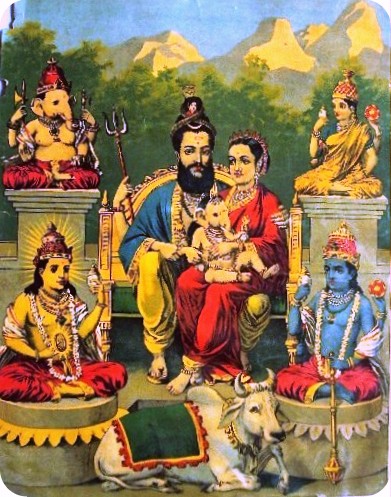Names of Lord Shiva
The month of Magha is meant for the worship of Siva, Vishnu, Surya, Devi and Ganesha. Particularly the last week of this month is devoted to the worship of Lord Shiva. It is the much-awaited annual holy festival of Lord Shiva for all the Devotees of this supreme God.
This is the most auspicious and greatest day for the devotees. The Object of worship, the worshipper and the process of worship are all the three essential things in every kind of worship. Similarly on this Mahasiva Ratri Day also it is essential to know about all these three things.
This present writing sheds focus on various magnanimous aspects of Siva the object of worship of Maha Sivaratri. It is known to all that Shiva has several thousands of names as available in the Mahabharata, Markandeya Purana, Skanda Purana and in the other Agama Texts.
Out of all these the following few names are much heard and very frequently found in most of the common prayers. These names have both phenomenal and philosophic meanings. A brief introduction is given to these names.
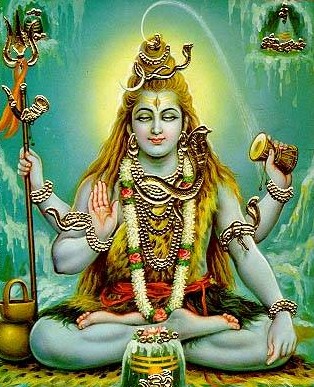
Rudra
Rudra is that aspect of Lord Shiva which clears away the ruja (disease) and duhkha (sorrow). Rudra is God dissolution. At the end of the creation, all the beings merge in Rudra. Hence he is called Layakara.
Another sense of this word is who makes all living beings to weep or to shout with pangs of separation of their relatives who were graced by Rudra to leave their mortal bodies. Thus the relieved souls merge in Him. The rest of the beings lament for the departed ones.
Shankara
One who makes the life auspicious is Shankara. Usually, Lord Shiva is believed to be the God of Dissolution. But all kinds of auspicious elements spring from this God. Hence he is called Shankara. Sham – means Auspiciousness. As he brings auspiciousness He is known by the name Shankara.
Sthanu
Phenomenally Sthanu means a pillar. As he is the single supporting pillar of the world (Samsara) he is called Sthanu.
Kapardi
A God of matted hair is called Kapardi. The inner meaning is that he is called Kapardi because of retaining the entire Divine River in his tight closed matted hair and released on the request of Bhagiratha.
Trilochana / Tryambaka
One who has three eyes is known as Trilochana or Tryambaka. His three eyes are The Sun, The Moon and The Fire. The Third Eye of Fire is the Eye of Fire like Pure Knowledge.
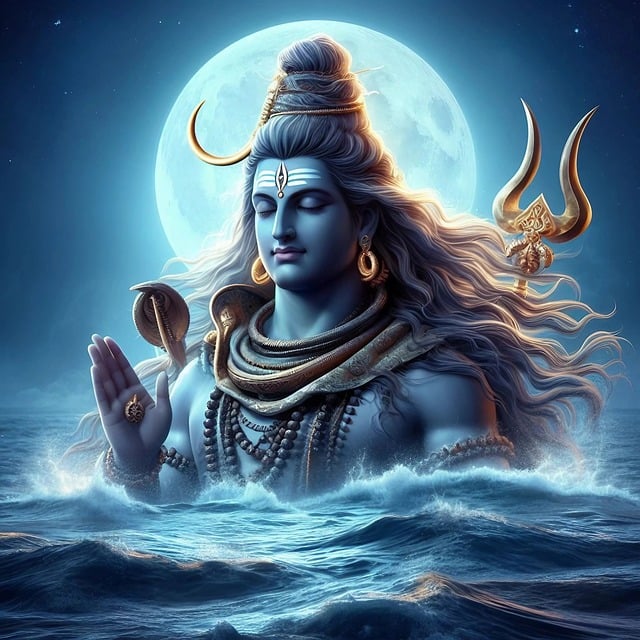
Shiva
As all the beings at the time of dissolution rest in this Supreme God he is called Lord Shiva. The other meaning of the word Shiva is the Auspicious one.
Adibhikshu
One meaning of this is the First Seeker of Alms. The inner meaning of this is that he begs for the six vices Kama (Desire), Krodha (Anger), Lobha (Greed), Moha (Infatuation), Mada (Intoxication) and Matsarya (Jealousy) in his devotees and blesses them with great boons for their upliftment.
Tripurantaka
The killer of the Three Cities of Demons was known as Tripurantaka. But one who dissolves the three tendencies in human beings: Sattva, Rajas and Tamas are called Tripurantaka.
Garalakantha
The word Garala means the poison. One who swallowed the dreadful poison Kalakuta is called Garalakantha. Here symbolically the worldly attractions are called poison. The human senses are attracted by worldly attractions and victimise human beings.
For protecting the devotees lord Shiva swallows the poison of worldly attractions and saves the devotees. Hence he is called Garalakantha.
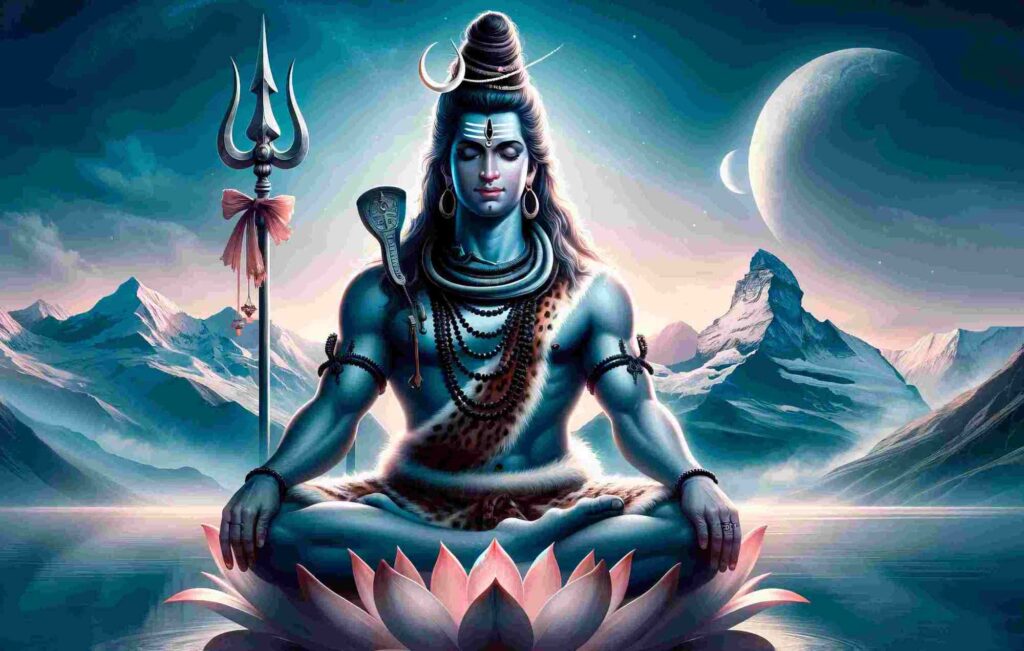
Nagabhushana
Whose ornaments are snakes he is Nagabhushana. Here Lord Shiva adorns himself with snakes of the six inner enemies Kama (Desire), Krodha (Anger), Lobha (Greed), Moha (Infatuation), Mada (Intoxication) and Matsarya (Jealousy) of the human world.
Hence Lord Shiva is praised with the epithet Nagabhushana.
Bhashmadharin
Lord Shiva besmears his body with the ashes from the burial ground. Hence he is called Bhashmadharin. Philosophically the ashes on the body of Lord Shiva are compared to the ashes of Karma (The past deeds) burnt by the Fire of Jnana (Knowledge).
Adi Kirata
Adi Kirata means the First Hunter. Lord Shiva is the hunter who chases after wild animals in the form of lust in human beings. Hence he is called Adi Kirata or the First Hunter as one has to suppress the inner desires before conquering the world.
Digambara
The word Digambara means undressed. Lord Shiva by nature is the form of pure knowledge without any adjectives. Hence such a form of pure knowledge is known as Digambara.
Vrushabhavahana
The word Vrushabha in Sanskrit is a representation of Dharma. Sometimes metaphorically Dharma is said to have been in the form of Vrushabha. As a Vrushabha has four feet and moves on four feet Dharma also lays on four feet and moves on four feet. Hence this resemblance.
Here Nandisvara, the vehicle of Shiva is considered as the divine manifestation of Dharma. Hence Shiva is called Vrushabhavahana as He is pervasive everywhere through Dharma.
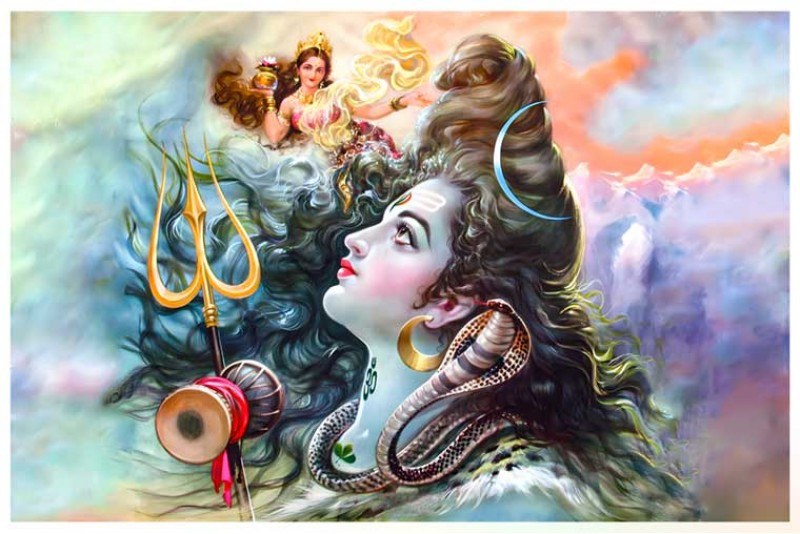
Trisulin
He is the wielder of Trident. This trident is the symbol of the three Gunas Sattva, Rajas and Tamas. As he bears all these three Gunas in Him He is called Trisulin. According to another interpretation, the three edges of the Trident are Peace, Dispassion and Realization.
Hence He, Lord Shiva, is called Trisulin.
Chandrasekhara
One who bears the crescent of the moon on his forehead is called Chandrasekhara. According to the second meaning, he sheds the rays of Nectar. So he is called Chandrasekhara.
Arthanarishvara
Both the forms of Purusha (the Consciousness) and Prakrti (The World) are the very forms of Lord Shiva. Hence known as Artha Nari and Artha Easwara together called Arthanarishvara.
Nataraja
Natya is Jnana of both the world and the cause of the world. As Lord Shiva does bestow Jnana he is extolled as the king of Natya or Nataraja.
Pashupati
All the beings (Jivas) are beasts (Pasus in Sanskrit). Mother Goddess Parvathi is the snares of the world that binds the beings (Pasa in Sanskrit) and Shiva is the ruler of all beings (Pasupati or Pasusasaka in Sanskrit).
In addition to the above important names, the following eight names have prominence in worshipping Lord Siva.
Sarva
The Ekmaranatha of Kanchipura is Lord Shiva of Prithvi Tattva or the Earthen Element and is recommended to be worshipped in the form of Sarva.
Bhava
Jambukesvara of Jambukesvaram at Sriranga Kshetra is the manifestation of the Jala Tattva or the Water Element and to be worshipped in the form of Bhava. Hence Bhava (The world the physical manifestation of Lord Shiva is known by the name Bhava).
Rudra
Arunachalesvara of Arunachala is said to be worshipped by the name Rudra and he is the Agni Tattva (The Element of Fire) aspect of Shiva.
Ugra
Lord Shiva at Srikalahasti is popular as Sri Kala Hastisvara. He is the manifestation of Vayu Tattva or the Element of Air. He is recommended to be worshipped by the name Ugra.
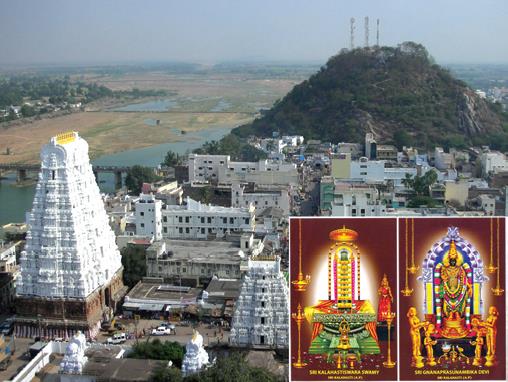
Bhima
Chidambaresvara of Chidambaram in Tamilnadu is the manifestation of the Akasa Tattva or the element of Ether. He is known by the name Bhima.
Pashupati
Pashupatinatha of Nepal is the Kshetrajna or the Supreme Consciousness in every individual due to whose presence Jiva becomes Shiva in the absence of whom Jiva remains a Sava (a mere corpse).
Isana
He is the presiding deity in all the Sun temples in India. Mahadeva- He is Somanatha in the Prabhasa Tirtha in Gujarat. He is said to be worshipped by the name Mahadeva the presiding deity of the Moon.
Thus having known these meanings of various names of Lord Siva if one worships Lord Siva the devotional discipline in every individual will lead him/her towards perfection as a human being in the spiritual journey.
